 Nick Pinkerton
Nick Pinkerton
In Paul Thomas Anderson’s action-comedy-drama about members of a leftist militant group, tidy ideologies make for a story more
soothing than disquieting.
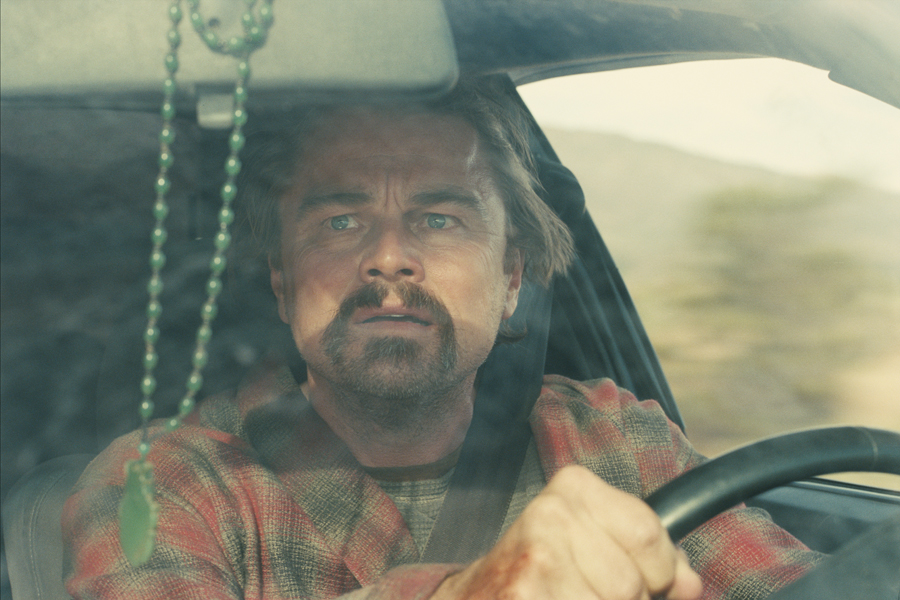
Leonardo DiCaprio as Bob Ferguson in One Battle After Another. Courtesy Warner Bros. Pictures.
One Battle After Another, written and directed by Paul Thomas Anderson, now playing in theaters
• • •
The tail end of the 1980s—that decade in which a triumphant conservative coalition with an amiably senescent president as its figurehead had set about dismantling the New Deal and fundamentally reshaped American politics—was occasion for a certain amount of soul-searching on the part of those who nurtured memories, bitter and fond, of the deferred dreams of the ’60s. Two films appeared in 1988, Sidney Lumet’s Running on Empty and Robert Kramer’s Doc’s Kingdom, about demobbed veterans of the militant counterculture and their tetchy relations with their children, now come of age. Since he’s not much for interviews, it’s impossible to know whether either film influenced Thomas Pynchon while writing 1990’s Vineland, set in 1984, that fateful year of Reagan’s reelection. But the same subject assayed by both movies constitutes one of the novel’s threads—a motif that Paul Thomas Anderson has seized on for One Battle After Another, which is less an adaptation of Pynchon’s book than an improvisation on themes suggested by it.
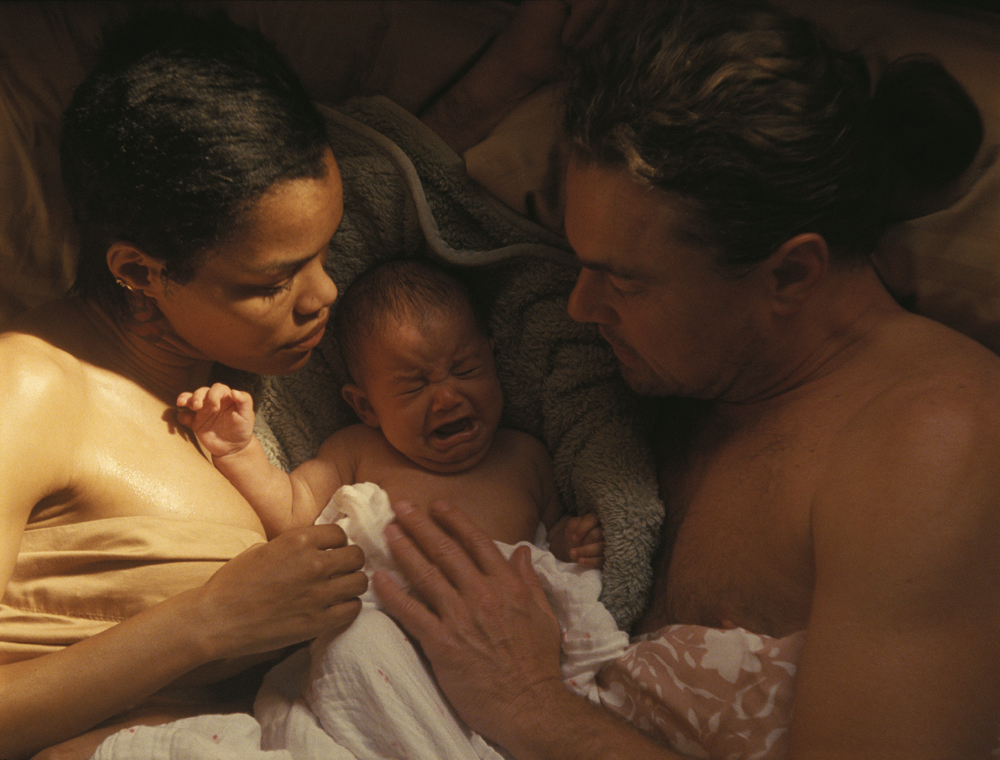
Teyana Taylor as Perfidia Beverly Hills and Leonardo DiCaprio as Bob Ferguson in One Battle After Another. Courtesy Warner Bros. Pictures.
Four of Vineland’s characters, with significant alterations, but none so great as to render them unrecognizable, have made it into Anderson’s film. These, introduced in an extended overture taking place sixteen years before the action of the rest of the present-day-set picture, are munitions expert Bob Ferguson (Leonardo DiCaprio); his revolutionary comrade and lover, Perfidia Beverly Hills (Teyana Taylor); their daughter, Willa; and their nemesis, merciless armed enforcer of the state and status quo, Col. Steven J. Lockjaw (Sean Penn). This brisk curtain-raiser follows Bob, Perfidia, and their compatriots in the “French 75” group on an adrenaline-pumping run of strikes against the system, including freeing migrants penned in a border detention center, bombings, and bank jobs, all while espousing a motto of “Free borders. Free choices. Free from fear.”
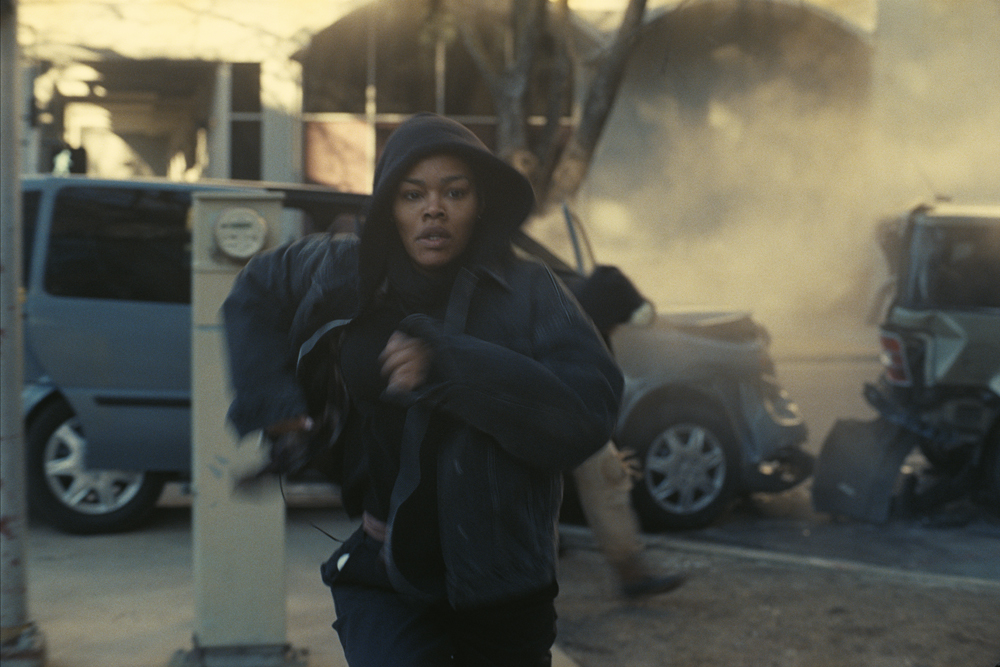
Teyana Taylor as Perfidia Beverly Hills in One Battle After Another. Courtesy Warner Bros. Pictures.
Lacking a robust late-aughts tradition of extralegal left-wing direct action to draw from outside of, say, that of the Animal Liberation Front, Anderson’s French 75 is an amalgam of present-tense ICE-age concerns and throwback, a mélange of the Weather Underground and the Black Panthers. And it is Perfidia, born of a long line of Black radicals, who will ultimately betray the cause, first coerced into sleeping with the enemy by Lockjaw—whose dedication to serving a power structure that Anderson’s film unequivocally identifies as premised on white supremacism coexists uncomfortably with his lust for his biological “inferiors”—then to, under duress, giving up her confederates.
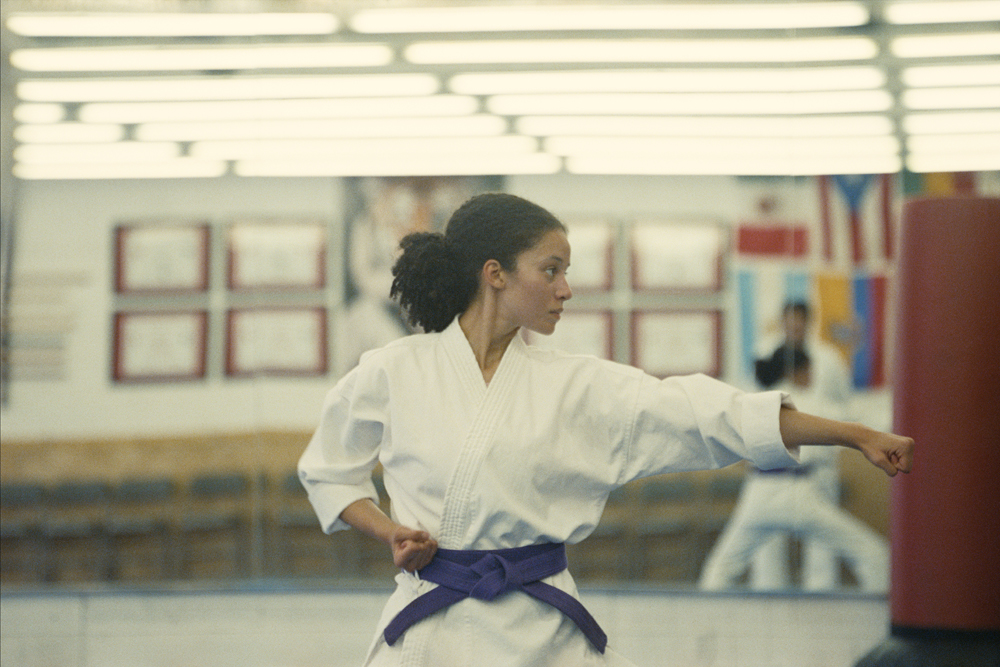
Chase Infiniti as Willa Ferguson in One Battle After Another. Courtesy Warner Bros. Pictures.
After the high of righteous rabble-rousing, the hangover. When we catch up with Bob, slipped through the net of Lockjaw’s bloody, no-due-process roundup, we find him settled into an off-the-grid existence in the sleepy (fictional) Northern California town of Baktan Cross, his primary occupations being over-protectively raising Willa, played, as a headstrong teenager, by Chase Infiniti, and boozing and blazing himself into a state of numb forgetfulness. This routine will be interrupted by the reappearance of Lockjaw, hot on the trail of the Fergusons for motives initially unclear, a small army of government goons in full tactical assault gear at his service.
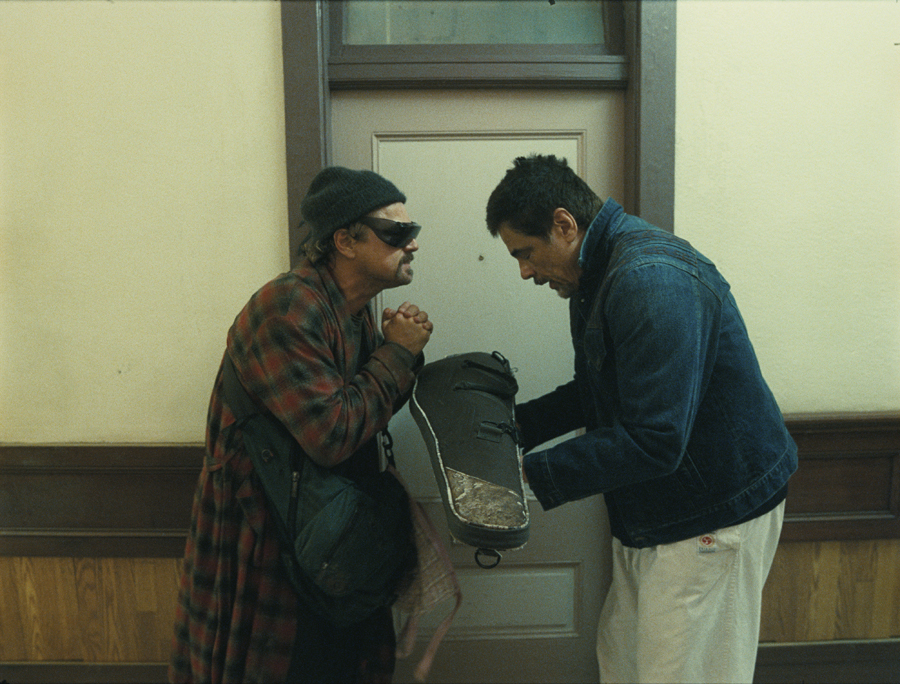
Leonardo DiCaprio as Bob Ferguson and Benicio del Toro as Sensei Sergio St. Carlos in One Battle After Another. Courtesy Warner Bros. Pictures.
From here, One Battle After Another becomes an extended chase: bumbling Bob, separated from his daughter, will cleave for aid to her karate instructor, Sergio (Benicio del Toro), while Willa shelters under the protective wing of one of her mother’s former confederates, Deandra (Regina Hall). The film’s presiding tone is seriocomic, with Infiniti tasked with much of the “serio” drudgery, and DiCaprio, the knockabout slapstick fun. Entrusted by Sergio to a group of lean teen skaters to lead him in flight from the law, Bob huffs and puffs like a couch-potato Irma Vep struggling to keep up with the kids’ nimble flitting across rooftops, his extravagant face-plant the movie’s comic highlight. Anderson’s gift for guy-talking-on-the-phone scenes, displayed to advantage in Punch-Drunk Love (2002), is put to good use in Bob’s exasperated dealings with what might be described as an insurrectionist emergency call center.
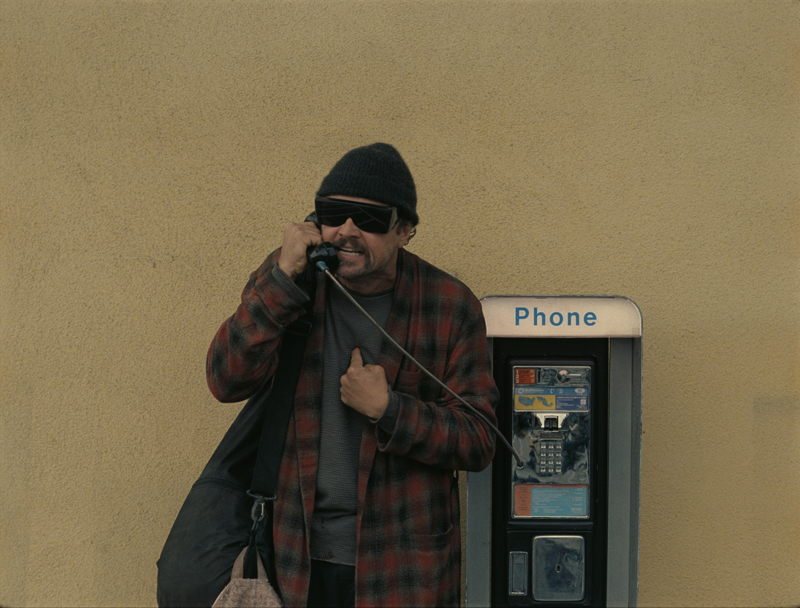
Leonardo DiCaprio as Bob Ferguson in One Battle After Another. Courtesy Warner Bros. Pictures.
Here, as in an earlier bit concerning pronouns, the attempts to mine humor from out-of-touch Bob’s bafflement with newfangled wokespeak—the operator prattles about “stolen land” and whinges about “noise triggers”—are slow-pitch softball lobs. It may seem quibbling to point out infidelities to source material in a movie that takes such liberties with its inspiration, but one of these departures—its handling of the dynamic between Perfidia and Lockjaw, which has a direct precedent in Vineland—is revealing. In Pynchon’s novel, both parties are free agents, both ideologically compromised by their verboten desire for the Other, with jackboot authoritarianism exuding an irresistible erotic pull for Pynchon’s libertine heroine. The troubling implications of this—that political convictions and sexual appetites do not, alas, necessarily correspond, and that the latter can prove more powerful than the former—are elided neatly in One Battle After Another. The film absolves Perfidia of being a willing, much less supplicant, participant in her own degradation, depicting the lone on-screen tryst between her and Lockjaw as a farcical meeting between trembling right-wing sub and his Black Bolshevik dom.
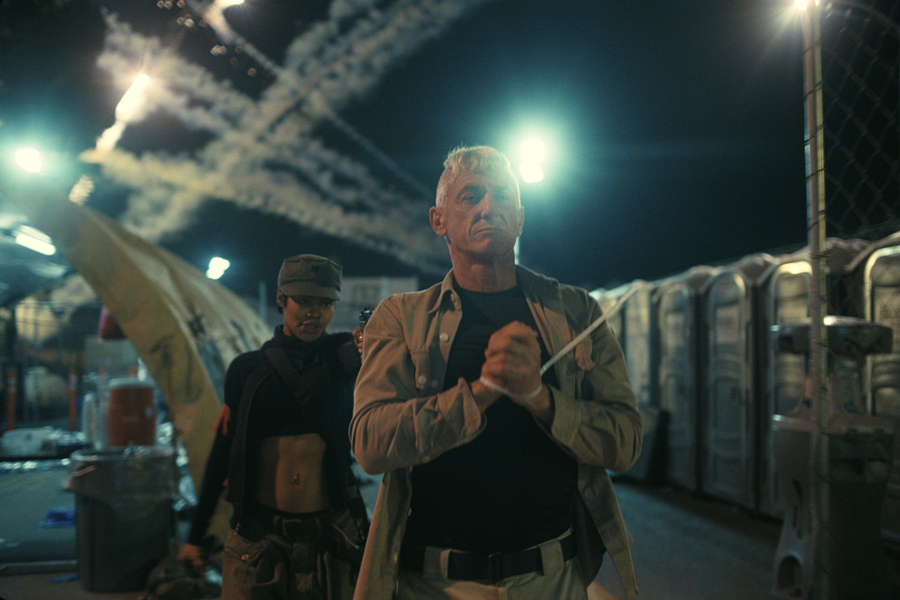
Teyana Taylor as Perfidia Beverly Hills and Sean Penn as Col. Steven J. Lockjaw in One Battle After Another. Courtesy Warner Bros. Pictures.
Anderson leaves scant room for ambiguity of motive in his film, in which the sort of professionally drilled domestic insurgents presented as the product of shadowy corporate machinations in Ari Aster’s Eddington are, in One Battle After Another, an actual, committed, rigorously trained resistance. And where the power brokers of Aster’s sublimely aggravating film remain in the shadows, One Battle After Another throws light on the underground lair of white-nationalist cabal “the Christmas Adventurers,” a group of grotesque country-club ofays whose ranks Lockjaw hopes to join by purging any evidence of his weakness for interracial sexual indiscretions.
The Christmas Adventurers’ subterranean redoubt is one of several hideouts in Anderson’s film, in which the fate of the embattled Republic is determined in a labyrinthine warren of tunnels lurking beneath blandly familiar American surfaces. These burrows and bunkers recall the backstage infrastructure uncovered in John Carpenter’s They Live (1988)—along with One Battle After Another, among a handful of baldly partisan action films made in the US over the past forty-odd years.
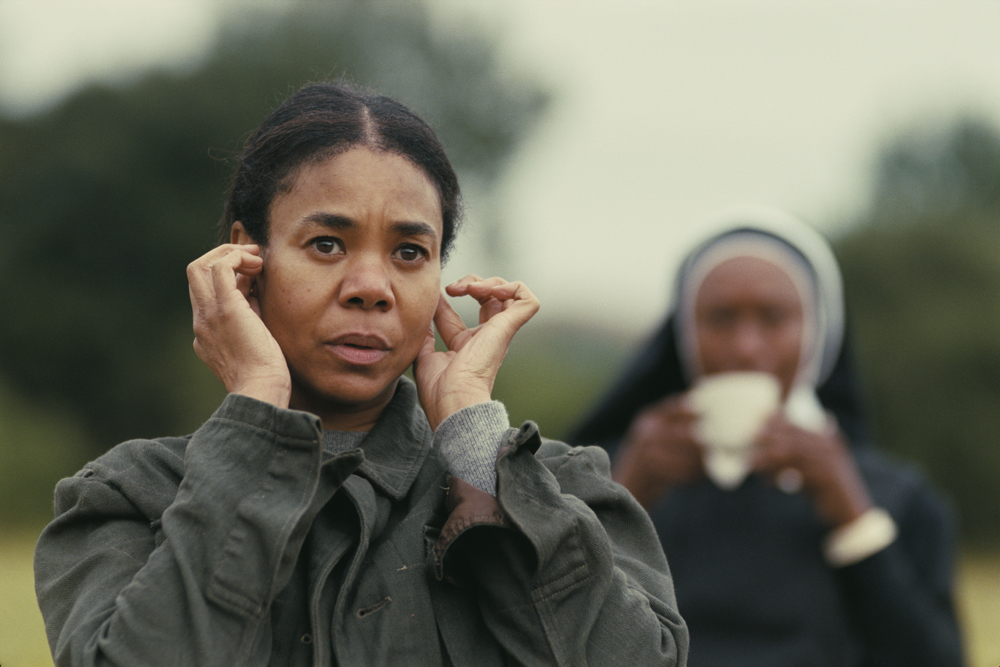
Regina Hall as Deandra in One Battle After Another. Courtesy Warner Bros. Pictures.
The very fact that Anderson’s movie is partisan will be enough to recommend it to some, for others to condemn it sight unseen—we live in strange times, when an assassin’s bullet can transform a podcaster into a modern Cicero. For a movie of the moment, though, One Battle After Another has a distinct vintage-shop musk—that wretched Steely Dan needle drop, the strained outlandishness of its Terry Southern–esque “counterculture humor” (nuns growing pot???). And as a pop cinema provocation, it lacks a single standout sequence to stand alongside Roddy Piper and Keith David’s endless alleyway brawl in Carpenter’s film, which also happens to function as an effective metaphor for the white and Black underclasses tearing one another apart while the elites stand aside.
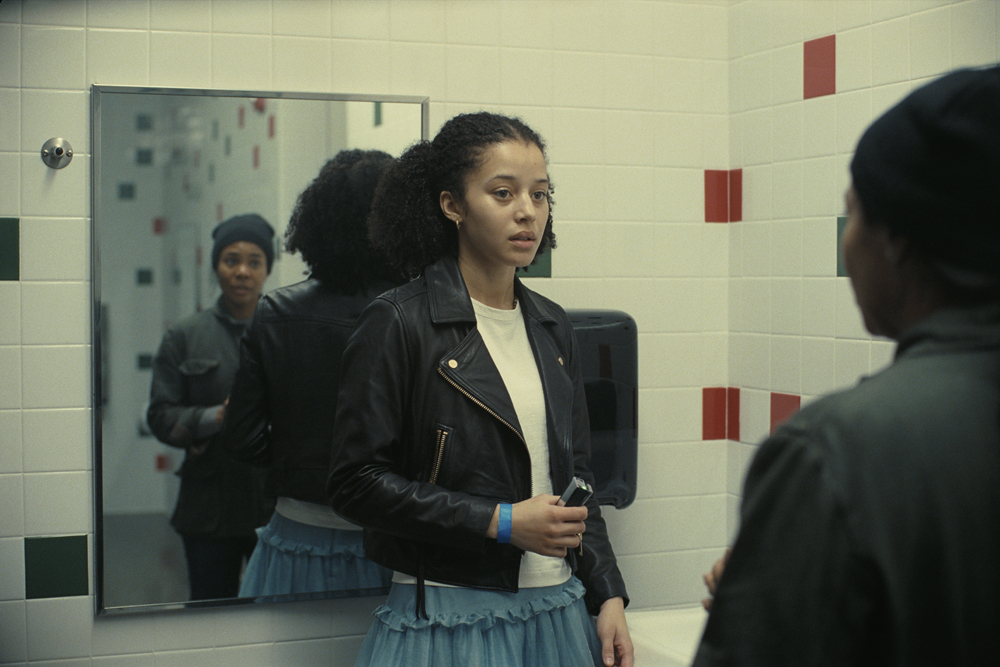
Chase Infiniti as Willa Ferguson and Regina Hall as Deandra in One Battle After Another. Courtesy Warner Bros. Pictures.
Anderson’s set pieces—which include a contract killer’s deus ex machina deliverance of Willa after miraculously developing a sense of solidarity with her and a car chase along undulating humps of steaming desert blacktop—don’t lack for broader implications of their own. What they’re missing is the exhilaration of palpable danger. Though sure to be painted as a national security risk by right-wing hysterics, Anderson’s belligerently titled film is more soothing than disquieting, concluding with a comforting coda in which the wicked are punished by their own and the flame of the eternal left is passed. One need not cast doubt upon the sincerity of anyone who proclaims this to be vital and sustaining cinema to observe that one person’s masterpiece can be another’s radical treacle.
Nick Pinkerton is the author of the book Goodbye, Dragon Inn, available from Fireflies Press as part of its Decadent Editions series. His writing on cinematic esoterica can be found at nickpinkerton.substack.com, among other venues. The Sweet East, a film from his original screenplay directed by Sean Price Williams, premiered in the Quinzaine des Cinéastes section of the 2023 Cannes Film Festival.